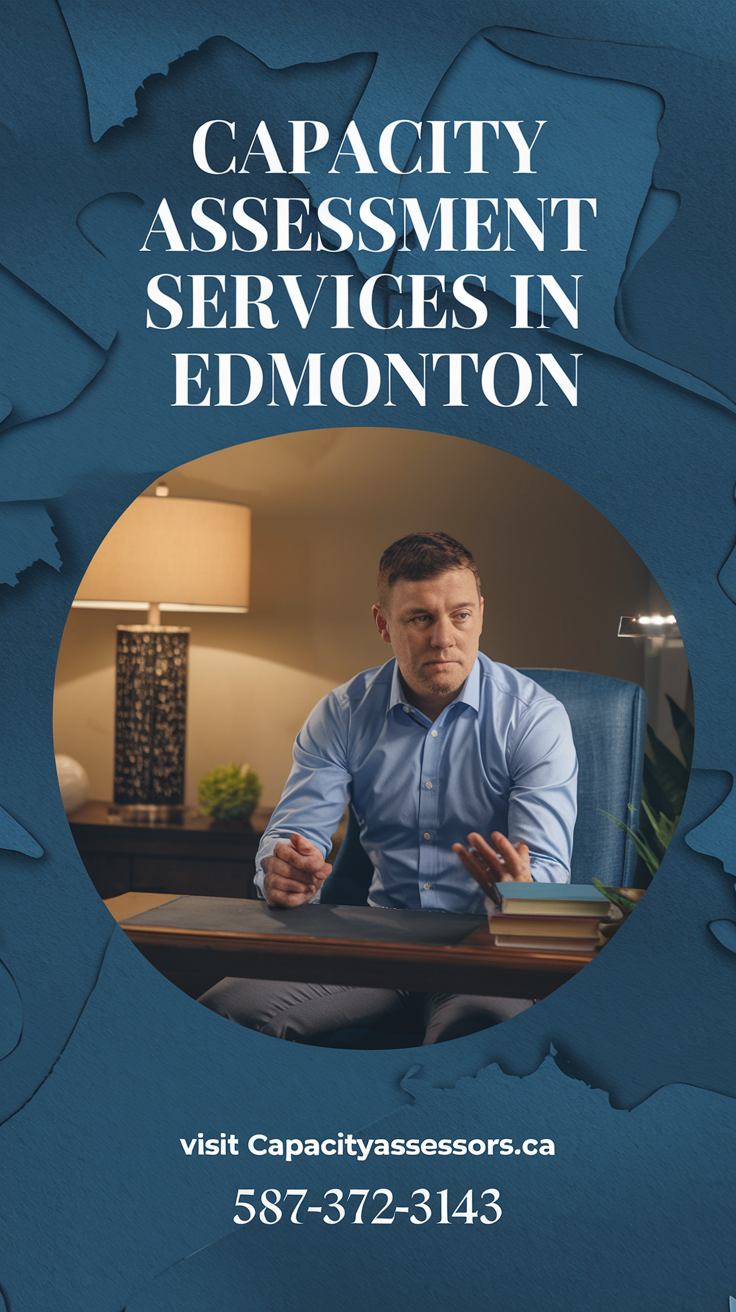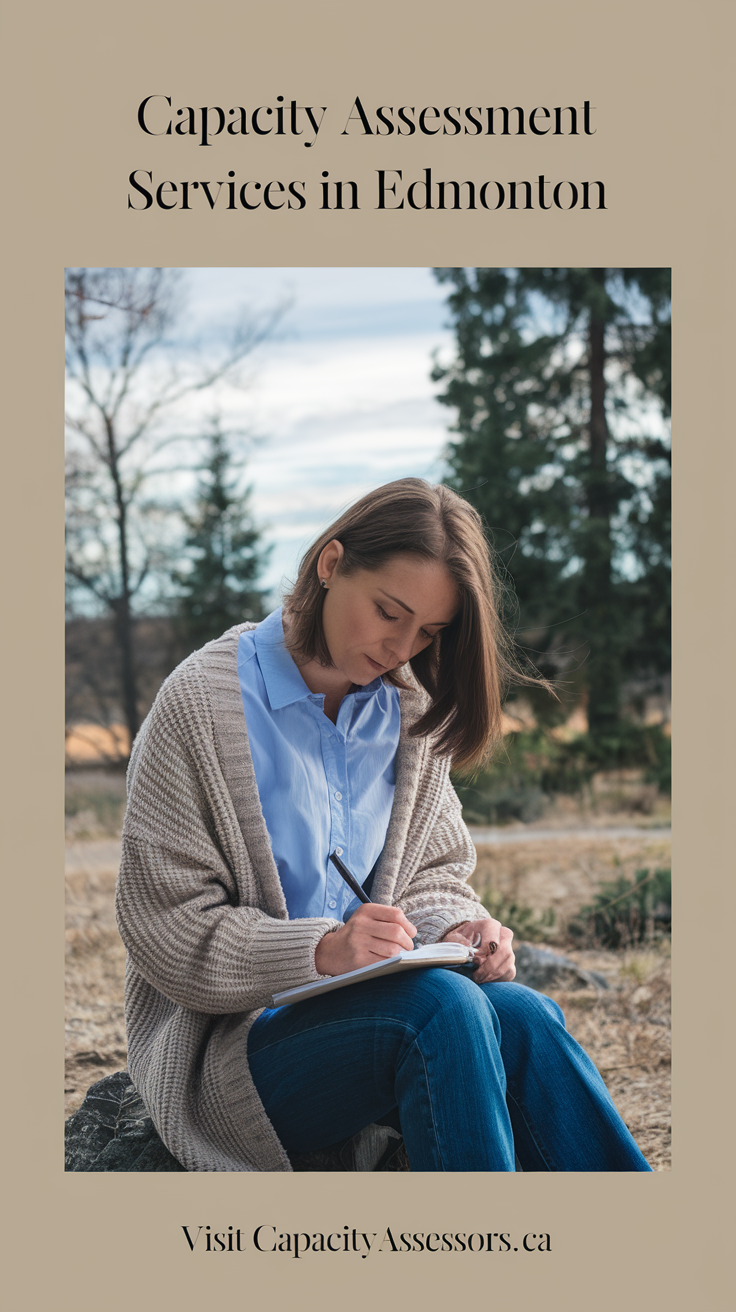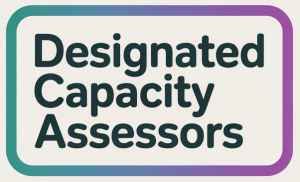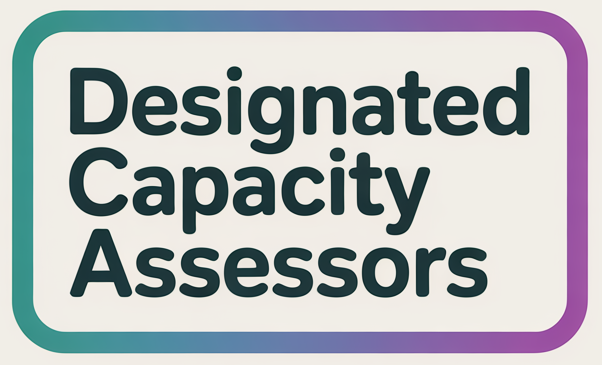Beyond Decisions: Why Capacity Assessment Matters in Edmonton (and How Mukesh Mishra Makes It Simple)

When my grandmother started forgetting where she put her keys—and, occasionally, whether she’d eaten breakfast—I wish we’d known sooner about capacity assessment. Many families in Edmonton face similar uncertainties: Is this just normal aging, or something more? That’s where capacity assessment steps in, but most people don’t even hear about it until a crisis forces rushed decisions. Let’s pull back the curtain on what capacity assessment really means, share real stories, and spotlight how Mukesh Mishra at capacityassessors.ca brings clarity, compassion, and expertise to the process across Greater Edmonton. Because, honestly, when it comes to big life choices, no one wants to guess.
So, What is Capacity Assessment? (And Why Does It Matter, Anyway?)
Let me start with something that might surprise you: capacity assessment isn’t about judging whether someone is “capable” or “incapable.” It’s actually about evaluating a person’s ability to understand and appreciate information when making decisions. Think of it less like a test you pass or fail, and more like a roadmap that helps figure out what support someone might need.
I’ve seen too many families struggle with this concept, especially when they’re facing tough choices about whether an aging parent can live independently. The confusion is understandable. Most people assume capacity assessment is just for seniors, but that’s not the whole picture. It impacts anyone dealing with neurological conditions, mental health challenges, or situations where decision-making abilities need to be evaluated.
When Does Capacity Assessment Actually Matter?
Research shows that capacity assessments are widely used in Alberta for legal and healthcare guidance. They come into play in several key situations:
- Legal matters: Guardianship decisions, power of attorney arrangements
- Healthcare choices: Treatment decisions, care planning
- Financial management: Banking, investments, property management
- Personal care situations: Living arrangements, daily support needs
Sometimes, these assessments are required for social programs like AISH or PDD applications. The process involves both psychological evaluation and a practical review of day-to-day functions. It’s more holistic than you might expect.
Busting the Biggest Myth
Here’s where I need to be clear about something important. Capacity assessment isn’t about “failing a test” or proving someone can’t make decisions. As Mukesh Mishra, a designated capacity assessor, puts it:
“Capacity is not an all-or-nothing state—it’s dynamic and unique to each person.”
This perspective matters because it shifts the focus from limitation to support. The assessment determines cognitive, emotional, and behavioral abilities, but it’s not just about inability. It addresses support needs, helping identify what assistance might be helpful while preserving as much autonomy as possible.
Real-Life Impact
Consider this scenario: Your parent is having memory issues, but they still enjoy cooking and managing their medication. A functional capacity assessment might reveal they can handle daily tasks with some support, but need help with complex financial decisions. That’s not failure—that’s valuable information for creating a support plan.
The process focuses on dignity and respect. A skilled assessor aims to empower, not strip away rights. They’re looking at decision-making capacity in specific contexts, understanding that someone might handle some choices independently while needing help with others.
Why This Matters for Edmonton Families
Capacity assessment isn’t just a legal hoop to jump through—it’s a safeguard for autonomy. When done properly, it provides a clear picture of someone’s strengths and support needs. This information becomes crucial for family members, healthcare providers, and legal professionals who want to respect the person’s wishes while ensuring their safety.
The psychological evaluation component looks at cognitive abilities, but it also considers emotional factors and behavioral patterns. This comprehensive approach helps create realistic, respectful support plans that honor the person’s preferences while addressing practical concerns.
For families in the Greater Edmonton Area, having access to qualified capacity assessors like Mukesh Mishra can make this process less overwhelming. The goal isn’t to take away someone’s rights, but to understand their needs and create appropriate support systems.
Meet Mukesh Mishra: Champion for Clarity and Compassion in the Edmonton Area
When families face difficult decisions about capacity assessments, they need more than just clinical evaluation—they need someone who truly understands their situation. That’s where Mukesh Mishra stands out as a registered, Designated Capacity Assessor in Alberta, bringing both professional expertise and genuine compassion to every assessment.
Mukesh Mishra has built his reputation on clear communication and deep respect for each client’s unique story. Unlike assessors who might rush through evaluations, he takes time to understand the person behind the assessment. This approach has earned him strong positive testimonials throughout the Edmonton community, where families consistently praise his ability to explain complex processes in ways everyone can understand.
“Assessing capacity is about facilitating the best possible outcome, not hunting for incapacity.”— Mukesh Mishra
This philosophy shapes every interaction. Research shows that Mukesh Mishra’s team differentiates with a human approach, something that becomes evident when you hear client feedback. “He explained everything in a way we actually understood,” one family shared. Another common response? “I felt heard, not judged.”
An Integrated Approach That Considers the Whole Person
What sets Mukesh apart from other capacity assessors is his integrated approach. He doesn’t just evaluate cognitive abilities in isolation—he considers personal values, family circumstances, and individual preferences. This comprehensive perspective ensures that assessments reflect the person’s true capacity while respecting their dignity and autonomy.
Take Sarah’s family, for example. They were unsure about guardianship options for their elderly father, who was showing signs of cognitive decline but still maintained strong opinions about his care. Mukesh’s assessment helped clarify that while their father needed support with financial decisions, he retained capacity for personal care choices. This nuanced evaluation allowed the family to pursue co-decision making rather than full guardianship, preserving their father’s independence where possible.
Local Expertise Across the Greater Edmonton Area
Mukesh’s deep knowledge of Edmonton’s community resources adds another layer of value to his assessments. He understands local support systems, healthcare networks, and community services that might benefit his clients. This local expertise means his recommendations aren’t just clinically sound—they’re practically applicable within the Edmonton area’s specific context.
His services extend across Greater Edmonton and surrounding regions, making professional capacity assessment highly accessible. Whether you’re in the city center or outlying communities, Mukesh maintains the same standard of thorough, empathetic evaluation. This accessibility has been crucial for families who might otherwise struggle to find qualified capacity assessors in their area.
Balancing Rigor with Empathy
The assessment process itself reflects Mukesh’s commitment to balancing clinical rigor with genuine empathy. He approaches each evaluation with the understanding that this might be one of the most challenging times in a family’s life. His method involves careful observation, thoughtful questioning, and patient explanation of findings—all delivered with the respect and sensitivity that families deserve.
This balance doesn’t compromise the assessment’s accuracy. Instead, it creates an environment where individuals feel comfortable demonstrating their true capabilities, leading to more accurate and meaningful evaluations.
Easy Access to Professional Assessment
Booking an appointment with Mukesh is straightforward. Families can schedule online through capacityassessors.ca or call directly at 578-372-3143. This dual booking system ensures that whether you’re comfortable with online scheduling or prefer speaking with someone directly, you can access the support you need.
The combination of professional expertise, genuine compassion, and practical accessibility makes Mukesh Mishra a trusted choice for capacity assessment throughout the Edmonton area. His approach transforms what could be an intimidating process into a supportive experience that truly serves families’ needs.
.png)
3. The Nitty-Gritty: What Really Happens in a Capacity Assessment?
I’ll be honest—when I first heard about capacity assessments, I pictured something clinical and intimidating. You know, sterile rooms with clipboards and rapid-fire questions. But after working with Mukesh Mishra and seeing how the capacity assessment process actually unfolds, I realized it’s refreshingly human.
It Starts with a Simple Chat
The initial conversation is usually less intimidating than you think. No pop quizzes or gotcha moments. Mukesh begins by asking about your day-to-day life, major decisions you’ve made recently, and any specific worries you might have. It’s conversational, not interrogational.
The objective here isn’t to find weaknesses—it’s to understand both strengths and challenges. No trick questions involved. This approach makes sense because, as research shows, assessment is flexible and not one-size-fits-all. Your morning routine matters just as much as how you handle financial decisions.
The Psychological Evaluation Component
Now, this might sound formal, but the psychological evaluation portion focuses on cognition, memory, and judgment in practical terms. Mukesh doesn’t just test your ability to recall dates or solve math problems. Instead, he explores how you process information when making real-world choices.
For instance, if you’re considering a move to assisted living, he’ll discuss how you weigh pros and cons, what factors matter most to you, and how you typically approach big decision making situations. It’s about understanding your thought process, not scoring your performance.
Family Input Makes a Difference
Here’s something I found particularly valuable: family members or caregivers can share observations for fuller context. Privacy and collaboration are foundational principles in this process. Your loved ones aren’t there to speak for you—they’re there to provide additional perspective on your daily experiences.
This collaborative approach reflects what studies indicate about effective capacity assessment: no single ‘test score’ decides your future. It’s nuanced and multidimensional, considering multiple viewpoints to create a complete picture.
The No-Judgment Zone
Privacy and dignity remain core throughout the entire process. Mukesh emphasizes creating a judgment-free environment where you can be honest about your concerns and capabilities. As he puts it:
“The real heart of assessment is understanding lived experience, not just ticking boxes.”
This philosophy shapes every interaction. Whether you’re in Edmonton, St. Albert, or anywhere within the Greater Edmonton Area, you’ll find the same respectful approach.
The “Perfect Score” Myth
Here’s a wild card that might surprise you: imagine someone tries to score a ‘perfect’ assessment. Turns out, it’s more about consistency and understanding than providing ‘right’ answers. Mukesh looks for patterns in how you think through problems, not whether you’ve memorized the ‘correct’ responses.
Someone who admits they struggle with complex financial decisions but has solid support systems might demonstrate better capacity than someone who claims perfect competence but shows inconsistent reasoning.
Documentation for Next Steps
Throughout the assessment, Mukesh documents findings that will guide legal or care planning steps. But this isn’t about labeling or limiting—it’s about understanding your unique situation so appropriate supports can be put in place.
The entire capacity assessment process adapts to individual needs, ensuring that whether you’re dealing with guardianship questions, support applications, or care planning decisions, you receive personalized attention.
Ready to learn more about how this process might work for your situation? You can book an appointment at capacityassessors.ca or call 578-372-3143 to discuss your specific needs.
4. Edmonton’s Reach: Service Areas Beyond the City Limits
When I tell people about my capacity assessment services, many assume I only work within Edmonton’s city limits. That’s not the case at all. The Greater Edmonton Area spans far beyond downtown, and I’ve made it my mission to serve communities throughout this entire region.
My services through capacityassessors.ca extend to areas within a 1-2 hour driving radius from central Edmonton. This includes St. Albert, Sherwood Park, Spruce Grove, Leduc, Fort Saskatchewan, Beaumont, and numerous other communities scattered across Alberta. Research shows that wide geographic coverage ensures service accessibility, which is exactly what I strive for.
I’ll never forget one particularly challenging winter day when I drove through a severe snowstorm to reach a client in Spruce Grove. The roads were treacherous, visibility was poor, but the family desperately needed the assessment completed. That’s what commitment looks like in practice. It’s not just about offering services—it’s about following through when people need you most.
Understanding Rural vs. Urban Needs
Working across the Edmonton Area has taught me something important: rural and urban clients often have different needs and concerns. City dwellers might worry about navigating complex healthcare systems, while rural families sometimes face unique challenges around distance to services or different community support networks.
This local understanding matters during capacity assessments. When I’m evaluating someone’s ability to make decisions about their care, I consider their actual living situation and available resources. A recommendation that works perfectly for someone in downtown Edmonton might not be practical for someone living in a smaller community an hour away.
Flexible Service Options
Geography shouldn’t be a barrier to quality assessment services. That’s why I offer multiple ways to connect with clients across the Edmonton Area:
- In-person visits: I travel to homes, care facilities, or convenient meeting locations
- Phone consultations: Perfect for initial discussions or follow-up conversations
- Online appointments: Video calls work well for certain types of assessments
The beauty of this flexibility is that clients can choose what works best for their situation. Some people prefer face-to-face meetings, especially for something as personal as a capacity assessment. Others find phone or online options more convenient, particularly if mobility is a concern.
Simple Booking Process
Scheduling an appointment is straightforward, regardless of where you’re located in the Edmonton Area. You can visit capacityassessors.ca/book-appointment-for-capacity-assessment/ to book online, or call me directly at 578-372-3143. I handle all the logistics, including travel arrangements to your location.
For locations beyond the city border, there may be a travel fee to cover transportation costs. This is always discussed upfront during booking, so there are no surprises later.
“No matter where you are in the Edmonton Area, you deserve access to quality assessment services.” — Mukesh Mishra
Consistent Professional Support
One thing I want to emphasize: distance doesn’t diminish the quality of service. Whether I’m working with a family in central Edmonton or driving out to Beaumont, every client receives the same thorough, professional assessment. The same attention to detail, the same compassionate approach, the same comprehensive reporting.
This consistency matters because capacity assessments are serious business. Families are making important decisions about their loved ones’ futures, and they deserve reliable, professional support regardless of their postal code. Online and phone services extend my reach even further, ensuring no one gets left out due to geography alone.
The Edmonton Area is home to diverse communities, each with its own character and needs. My goal is to serve them all with equal dedication and professionalism.
5. Dollars and Sense: What to Expect from Pricing and Booking
Let’s talk money. When you’re dealing with something as important as capacity assessment services, you want to know exactly what you’re paying for—and why it’s worth every dollar.
At capacityassessors.ca, the pricing features are refreshingly straightforward. For guardianship or co-decision making assessments, you’re looking at $500. If you need both guardianship and trusteeship evaluation, that’s $700. Simple. No confusing tiers or hidden calculations.
Now, if you’re located in one of those communities that’s 1-2 hours out from Edmonton—places like Camrose, Lloydminster, or Cold Lake—there might be additional travel costs. But here’s the thing: they’ll tell you upfront. No surprises when the bill arrives.
What You’re Actually Paying For
These prices aren’t just numbers pulled from thin air. They reflect the experience of professional capacity assessors like Mukesh Mishra, the quality of comprehensive reports, and the full service you receive. We’re talking about credentialed professionals who understand the weight of their assessments.
I remember one client telling me that the peace of mind they got from a swift, smooth process was “worth every penny.” That stuck with me because it captures something important—this isn’t just about paperwork. It’s about getting clarity during what’s often a difficult time.
“Transparent pricing means families can plan ahead without surprises.”— Mukesh Mishra
Research shows that transparent, competitive pricing with no surprise charges makes all the difference for families already dealing with stress. When you know what you’re paying and why, you can focus on what really matters.
Booking Your Assessment
The booking process? It’s designed to be as painless as possible. You’ve got multiple options—online through the website at https://capacityassessors.ca/book-appointment-for-capacity-assessment/ or simply call 578-372-3143. Both work equally well, so choose whatever feels more comfortable.
The online booking system is particularly user-friendly. You can schedule from home, see available time slots, and get confirmation right away. No phone tag, no waiting for callbacks during business hours.
For those who prefer the human touch, the phone line offers that personal connection. Sometimes you have questions that are easier to ask when you’re talking to a real person.
The Quality Factor
Here’s where I need to be blunt: if you’re thinking about “bargain shopping” for capacity assessments, stop right there. This isn’t the place to cut corners. Expertise and accuracy are everything in this field.
The assessment services provided through capacityassessors.ca come with quality guarantees. You’re getting professional, credentialed assessors who understand the legal requirements and the human element of these evaluations.
Think about it this way—a poorly done assessment might save you a few dollars upfront, but it could cost you significantly more in time, stress, and potentially having to redo the entire process.
No Hidden Fees Promise
What you see is what you pay. The transparent upfront pricing means you can plan your budget without worrying about unexpected charges appearing later. Whether you’re in Edmonton proper or in surrounding areas like St. Albert, Sherwood Park, or Spruce Grove, the pricing structure remains clear and predictable.
This transparency extends to the entire process. From initial consultation through final report delivery, you’ll know what to expect at each step. It’s this kind of clarity that makes the whole experience more manageable for families navigating challenging decisions.

6. When is the ‘Right Time’ To Seek a Capacity Assessment? Spot the Signals
I’ve learned that families often wait too long. They notice the small changes but convince themselves it’s just normal aging challenges. Then one day, everything feels overwhelming, and they wish they’d acted sooner.
Early Warning Signs You Shouldn’t Ignore
The signals start subtle. Memory lapses become more frequent. Your parent forgets appointments or struggles with bills they’ve handled for decades. Maybe they’re confused about time or can’t follow familiar routines. These aren’t just bad days—they’re red flags.
I remember when my neighbor started paying the same bill twice or leaving the stove on. Her family thought she was just stressed. Looking back, those were clear indicators that her decision making abilities were changing.
When Families Feel Lost
Mounting stress for families is real. You’re unsure about next steps for aging parents, caught between respecting their independence and ensuring their safety. This uncertainty creates tension at family gatherings and sleepless nights wondering if you’re doing enough.
Research shows that proactive assessment reduces family stress and supports thoughtful planning. When you have clear information about someone’s abilities, you can make informed decisions together instead of guessing.
Legal Triggers That Demand Action
Sometimes the timing isn’t your choice. Legal triggers like planning for power of attorney or guardianship require formal capacity assessments. Lawyers, hospitals, or care facilities might request documentation before proceeding with important decisions.
In Edmonton and surrounding areas within 1-2 hours driving distance—including St. Albert, Sherwood Park, and Fort Saskatchewan—Mukesh Mishra provides these essential assessments. You can book appointments at capacityassessors.ca or call 578-372-3143.
Functional Red Flags at Home
Poor judgment with money is a major concern. When someone starts making unusual purchases, giving money to strangers, or falling for scams, their personal care decisions might also be compromised. Unsafe choices at home—like leaving doors unlocked, not taking medication, or driving when they shouldn’t—signal deeper issues.
These functional problems affect daily life immediately. They’re not abstract concerns but real safety risks that need professional evaluation.
Key Moments to Act
Aging challenges and neurological conditions create natural transition points. After a stroke, with dementia diagnosis, or following a serious fall, capacity assessment helps determine what support is needed. Don’t wait for crisis—these moments offer opportunities for thoughtful planning.
Sometimes hospitals or care facilities trigger the process. They need official documentation before discharge or admission. Other times, family members recognize patterns and seek answers proactively.
Personal Reflection: Learning from Experience
I wish we’d acted before confusion turned to crisis. Waiting until someone is in emergency mode makes everything harder. The person feels attacked, family members feel guilty, and options become limited.
“Acting early is an act of care, not doubt.” — Mukesh Mishra
Early assessment prevents major disruptions. It’s best when done before urgent crisis—proactive, not reactive. This approach empowers families to plan with confidence, knowing they have accurate information about their loved one’s abilities and needs.
The right time isn’t when everything falls apart. It’s when you first notice changes that concern you. Trust your instincts. Capacity assessment services are available throughout the Greater Edmonton Area, making it easier to get the answers you need when you need them.
7. More Than a Paper Trail: The Lasting Benefits of Capacity Assessment for Community Life
I’ve seen countless families discover that capacity assessment isn’t just paperwork—it’s a gateway to meaningful community life. When I work with clients across the Greater Edmonton Area, from St. Albert to Sherwood Park, the transformation often surprises everyone involved.
Think of a capacity assessment like clearing fog from your windshield before a long drive. You’re not just removing obstacles—you’re revealing possibilities you couldn’t see before. That’s exactly what happens when someone gets a proper functional capacity evaluation.
Guiding Life’s Big Decisions with Clarity
Beyond legal requirements, assessment services help people navigate major life choices with confidence. I’ve watched clients make informed decisions about where to live, how to manage their finances, and what kind of support they actually need. It’s not about limiting choices—it’s about making them with full understanding.
Research shows that assessment is a tool for empowerment, not just bureaucracy. When someone knows their strengths and areas where they need support, they can participate more fully in their own life planning.
Supporting Independent Living and Safe Transitions
The dignity aspect matters enormously. I’ve helped families in Leduc, Fort Saskatchewan, and throughout the Edmonton region understand that capacity assessment supports independence, not dependence. Sometimes it confirms someone can live alone with minimal support. Other times, it guides a safe transition to more structured care.
Both outcomes preserve dignity when handled properly. The assessment provides the roadmap for whatever level of community life works best for each individual.
Fostering Family Peace and Collaboration
Family conflict often stems from uncertainty. When I complete assessments in areas like Spruce Grove or Stony Plain, families frequently tell me they feel relieved to have clear, professional guidance. Less guessing means less arguing.
Instead of family members taking sides about what’s “best,” everyone can focus on supporting the person’s actual needs. The assessment becomes a shared reference point for collaborative decision-making.
Unlocking Access to Community Supports
Here’s something many people don’t realize: capacity assessments often unlock access to vital services like AISH (Assured Income for the Severely Handicapped) and PDD (Persons with Developmental Disabilities). These programs require documentation of functional capacity, which is exactly what a proper assessment provides.
I’ve helped clients throughout the region access housing supports, healthcare benefits, and disability services they didn’t know were available. The assessment becomes their key to community resources.
Supporting Personal Care and Financial Decision-Making
When someone needs help with financial decisions or personal care, the assessment guides exactly what kind of support works best. Maybe they need help with complex financial planning but can handle daily money management. Or perhaps they’re great with personal care but need support with medical decisions.
The nuanced understanding that comes from professional assessment helps families and support workers provide exactly the right level of assistance.
“Assessment isn’t an end—it’s a beginning for better support.” — Mukesh Mishra
Your Next Step
If you’re in Edmonton or within driving distance—from Devon to Beaumont, from Morinville to Camrose—capacity assessment services are available through capacityassessors.ca. The process starts with understanding, not judgment.
Ready to clear the fog and see the possibilities? Book your appointment at https://capacityassessors.ca/book-appointment-for-capacity-assessment/ or call 578-372-3143. Your community life—and your family’s peace of mind—deserves this clarity.
TL;DR: Capacity assessment offers a compassionate way to understand decision-making abilities—especially as we age or face new challenges. In Edmonton and surrounding communities, Mukesh Mishra and his team at capacityassessors.ca make the process accessible, professional, and supportive. If you or a loved one need a clear path forward, expert help is just an appointment away.
Share this :

We provide Capacity Assessment Service in Greater Edmonton Area and 1-2 hrs driving distance from Edmonton .






